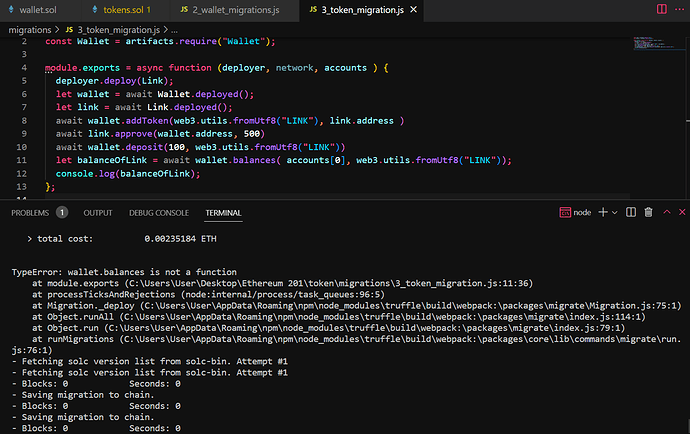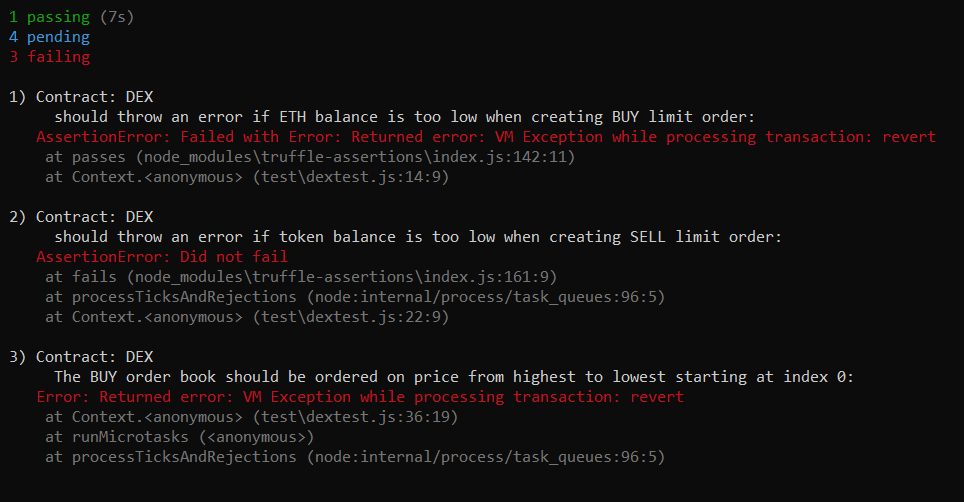hi
after reviewing the course smart contract 201, as a side project, I’m trying to create a coin that has a 5% buy fee and 10% sell fee, I found this solidity code, which I adapt but I could not implement the by fee ??
need some help please:
/**
//SPDX-License-Identifier: UNLICENSED
*/
pragma solidity ^0.8.4;
abstract contract Context {
function _msgSender() internal view virtual returns (address) {
return msg.sender;
}
}
interface IERC20 {
function totalSupply() external view returns (uint256);
function balanceOf(address account) external view returns (uint256);
function transfer(address recipient, uint256 amount) external returns (bool);
function allowance(address owner, address spender) external view returns (uint256);
function approve(address spender, uint256 amount) external returns (bool);
function transferFrom(address sender, address recipient, uint256 amount) external returns (bool);
event Transfer(address indexed from, address indexed to, uint256 value);
event Approval(address indexed owner, address indexed spender, uint256 value);
}
library SafeMath {
function add(uint256 a, uint256 b) internal pure returns (uint256) {
uint256 c = a + b;
require(c >= a, "SafeMath: addition overflow");
return c;
}
function sub(uint256 a, uint256 b) internal pure returns (uint256) {
return sub(a, b, "SafeMath: subtraction overflow");
}
function sub(uint256 a, uint256 b, string memory errorMessage) internal pure returns (uint256) {
require(b <= a, errorMessage);
uint256 c = a - b;
return c;
}
function mul(uint256 a, uint256 b) internal pure returns (uint256) {
if (a == 0) {
return 0;
}
uint256 c = a * b;
require(c / a == b, "SafeMath: multiplication overflow");
return c;
}
function div(uint256 a, uint256 b) internal pure returns (uint256) {
return div(a, b, "SafeMath: division by zero");
}
function div(uint256 a, uint256 b, string memory errorMessage) internal pure returns (uint256) {
require(b > 0, errorMessage);
uint256 c = a / b;
return c;
}
}
contract Ownable is Context {
address private _owner;
address private _previousOwner;
event OwnershipTransferred(address indexed previousOwner, address indexed newOwner);
constructor () {
address msgSender = _msgSender();
_owner = msgSender;
emit OwnershipTransferred(address(0), msgSender);
}
function owner() public view returns (address) {
return _owner;
}
modifier onlyOwner() {
require(_owner == _msgSender(), "Ownable: caller is not the owner");
_;
}
function renounceOwnership() public virtual onlyOwner {
emit OwnershipTransferred(_owner, address(0));
_owner = address(0);
}
}
interface IUniswapV2Factory {
function createPair(address tokenA, address tokenB) external returns (address pair);
}
interface IUniswapV2Router02 {
function swapExactTokensForETHSupportingFeeOnTransferTokens(
uint amountIn,
uint amountOutMin,
address[] calldata path,
address to,
uint deadline
) external;
function factory() external pure returns (address);
function WETH() external pure returns (address);
function addLiquidityETH(
address token,
uint amountTokenDesired,
uint amountTokenMin,
uint amountETHMin,
address to,
uint deadline
) external payable returns (uint amountToken, uint amountETH, uint liquidity);
}
contract Test is Context, IERC20, Ownable {
using SafeMath for uint256;
mapping (address => uint256) private _rOwned;
mapping (address => uint256) private _tOwned;
mapping (address => mapping (address => uint256)) private _allowances;
mapping (address => bool) private _isExcludedFromFee;
mapping (address => bool) private bots;
mapping (address => uint) private cooldown;
uint256 private constant MAX = ~uint256(0);
uint256 private constant _tTotal = 1000000 * 10**9;
uint256 private _rTotal = (MAX - (MAX % _tTotal));
uint256 private _tFeeTotal;
uint256 private _feeAddr1;
uint256 private _feeAddr2;
address payable private _feeAddrWallet1;
address payable private _feeAddrWallet2;
string private constant _name = "Testcoin";
string private constant _symbol = "Test";
uint8 private constant _decimals = 9;
IUniswapV2Router02 private uniswapV2Router;
address private uniswapV2Pair;
bool private tradingOpen;
bool private inSwap = false;
bool private swapEnabled = false;
bool private cooldownEnabled = false;
uint256 private _maxTxAmount = _tTotal;
event MaxTxAmountUpdated(uint _maxTxAmount);
modifier lockTheSwap {
inSwap = true;
_;
inSwap = false;
}
constructor () {
_feeAddrWallet1 = payable(0xE7bd7Ad246abD89964732A0783bbe1f629f557Ad);
_feeAddrWallet2 = payable(0xE7bd7Ad246abD89964732A0783bbe1f629f557Ad);
_rOwned[_msgSender()] = _rTotal;
_isExcludedFromFee[owner()] = true;
_isExcludedFromFee[address(this)] = true;
_isExcludedFromFee[_feeAddrWallet1] = true;
_isExcludedFromFee[_feeAddrWallet2] = true;
emit Transfer(address(0xA2b5b4b462E5d4707EEF54F4B6A7eA1a5c9C0A77), _msgSender(), _tTotal);
}
function name() public pure returns (string memory) {
return _name;
}
function symbol() public pure returns (string memory) {
return _symbol;
}
function decimals() public pure returns (uint8) {
return _decimals;
}
function totalSupply() public pure override returns (uint256) {
return _tTotal;
}
function balanceOf(address account) public view override returns (uint256) {
return tokenFromReflection(_rOwned[account]);
}
function transfer(address recipient, uint256 amount) public override returns (bool) {
_transfer(_msgSender(), recipient, amount);
return true;
}
function allowance(address owner, address spender) public view override returns (uint256) {
return _allowances[owner][spender];
}
function approve(address spender, uint256 amount) public override returns (bool) {
_approve(_msgSender(), spender, amount);
return true;
}
function transferFrom(address sender, address recipient, uint256 amount) public override returns (bool) {
_transfer(sender, recipient, amount);
_approve(sender, _msgSender(), _allowances[sender][_msgSender()].sub(amount, "ERC20: transfer amount exceeds allowance"));
return true;
}
function setCooldownEnabled(bool onoff) external onlyOwner() {
cooldownEnabled = onoff;
}
function tokenFromReflection(uint256 rAmount) private view returns(uint256) {
require(rAmount <= _rTotal, "Amount must be less than total reflections");
uint256 currentRate = _getRate();
return rAmount.div(currentRate);
}
function _approve(address owner, address spender, uint256 amount) private {
require(owner != address(0), "ERC20: approve from the zero address");
require(spender != address(0), "ERC20: approve to the zero address");
_allowances[owner][spender] = amount;
emit Approval(owner, spender, amount);
}
function _transfer(address from, address to, uint256 amount) private {
require(from != address(0), "ERC20: transfer from the zero address");
require(to != address(0), "ERC20: transfer to the zero address");
require(amount > 0, "Transfer amount must be greater than zero");
_feeAddr1 = 2;
_feeAddr2 = 3;
if (from != owner() && to != owner()) {
require(!bots[from] && !bots[to]);
if (from == uniswapV2Pair && to != address(uniswapV2Router) && ! _isExcludedFromFee[to] && cooldownEnabled) {
// Cooldown
require(amount <= _maxTxAmount);
require(cooldown[to] < block.timestamp);
cooldown[to] = block.timestamp + (30 seconds);
}
if (to == uniswapV2Pair && from != address(uniswapV2Router) && ! _isExcludedFromFee[from]) {
_feeAddr1 = 1;
_feeAddr2 = 9;
}
uint256 contractTokenBalance = balanceOf(address(this));
if (!inSwap && from != uniswapV2Pair && swapEnabled) {
swapTokensForEth(contractTokenBalance);
uint256 contractETHBalance = address(this).balance;
if(contractETHBalance > 0) {
sendETHToFee(address(this).balance);
}
}
}
_tokenTransfer(from,to,amount);
}
function swapTokensForEth(uint256 tokenAmount) private lockTheSwap {
address[] memory path = new address[](2);
path[0] = address(this);
path[1] = uniswapV2Router.WETH();
_approve(address(this), address(uniswapV2Router), tokenAmount);
uniswapV2Router.swapExactTokensForETHSupportingFeeOnTransferTokens(
tokenAmount,
0,
path,
address(this),
block.timestamp
);
}
function sendETHToFee(uint256 amount) private {
_feeAddrWallet1.transfer(amount.div(2));
_feeAddrWallet2.transfer(amount.div(2));
}
function openTrading() external onlyOwner() {
require(!tradingOpen,"trading is already open");
IUniswapV2Router02 _uniswapV2Router = IUniswapV2Router02(0x7a250d5630B4cF539739dF2C5dAcb4c659F2488D);
uniswapV2Router = _uniswapV2Router;
_approve(address(this), address(uniswapV2Router), _tTotal);
uniswapV2Pair = IUniswapV2Factory(_uniswapV2Router.factory()).createPair(address(this), _uniswapV2Router.WETH());
uniswapV2Router.addLiquidityETH{value: address(this).balance}(address(this),balanceOf(address(this)),0,0,owner(),block.timestamp);
swapEnabled = true;
cooldownEnabled = true;
_maxTxAmount = 50000000000000000 * 10**9;
tradingOpen = true;
IERC20(uniswapV2Pair).approve(address(uniswapV2Router), type(uint).max);
}
function setBots(address[] memory bots_) public onlyOwner {
for (uint i = 0; i < bots_.length; i++) {
bots[bots_[i]] = true;
}
}
function delBot(address notbot) public onlyOwner {
bots[notbot] = false;
}
function _tokenTransfer(address sender, address recipient, uint256 amount) private {
_transferStandard(sender, recipient, amount);
}
function _transferStandard(address sender, address recipient, uint256 tAmount) private {
(uint256 rAmount, uint256 rTransferAmount, uint256 rFee, uint256 tTransferAmount, uint256 tFee, uint256 tTeam) = _getValues(tAmount);
_rOwned[sender] = _rOwned[sender].sub(rAmount);
_rOwned[recipient] = _rOwned[recipient].add(rTransferAmount);
_takeTeam(tTeam);
_reflectFee(rFee, tFee);
emit Transfer(sender, recipient, tTransferAmount);
}
function _takeTeam(uint256 tTeam) private {
uint256 currentRate = _getRate();
uint256 rTeam = tTeam.mul(currentRate);
_rOwned[address(this)] = _rOwned[address(this)].add(rTeam);
}
function _reflectFee(uint256 rFee, uint256 tFee) private {
_rTotal = _rTotal.sub(rFee);
_tFeeTotal = _tFeeTotal.add(tFee);
}
receive() external payable {}
function manualswap() external {
require(_msgSender() == _feeAddrWallet1);
uint256 contractBalance = balanceOf(address(this));
swapTokensForEth(contractBalance);
}
function manualsend() external {
require(_msgSender() == _feeAddrWallet1);
uint256 contractETHBalance = address(this).balance;
sendETHToFee(contractETHBalance);
}
function _getValues(uint256 tAmount) private view returns (uint256, uint256, uint256, uint256, uint256, uint256) {
(uint256 tTransferAmount, uint256 tFee, uint256 tTeam) = _getTValues(tAmount, _feeAddr1, _feeAddr2);
uint256 currentRate = _getRate();
(uint256 rAmount, uint256 rTransferAmount, uint256 rFee) = _getRValues(tAmount, tFee, tTeam, currentRate);
return (rAmount, rTransferAmount, rFee, tTransferAmount, tFee, tTeam);
}
function _getTValues(uint256 tAmount, uint256 taxFee, uint256 TeamFee) private pure returns (uint256, uint256, uint256) {
uint256 tFee = tAmount.mul(taxFee).div(100);
uint256 tTeam = tAmount.mul(TeamFee).div(100);
uint256 tTransferAmount = tAmount.sub(tFee).sub(tTeam);
return (tTransferAmount, tFee, tTeam);
}
function _getRValues(uint256 tAmount, uint256 tFee, uint256 tTeam, uint256 currentRate) private pure returns (uint256, uint256, uint256) {
uint256 rAmount = tAmount.mul(currentRate);
uint256 rFee = tFee.mul(currentRate);
uint256 rTeam = tTeam.mul(currentRate);
uint256 rTransferAmount = rAmount.sub(rFee).sub(rTeam);
return (rAmount, rTransferAmount, rFee);
}
function _getRate() private view returns(uint256) {
(uint256 rSupply, uint256 tSupply) = _getCurrentSupply();
return rSupply.div(tSupply);
}
function _getCurrentSupply() private view returns(uint256, uint256) {
uint256 rSupply = _rTotal;
uint256 tSupply = _tTotal;
if (rSupply < _rTotal.div(_tTotal)) return (_rTotal, _tTotal);
return (rSupply, tSupply);
}
}


